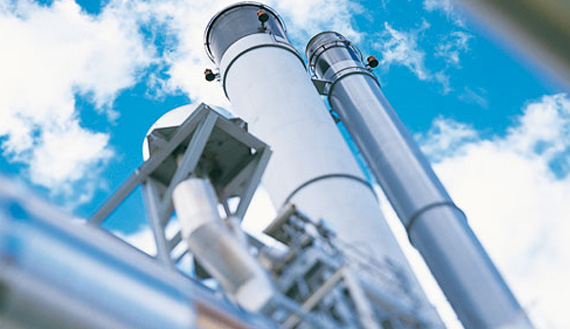
An evaluation of the LBST Power-to-Gas (PtG) database shows that PtG-technology is advancing towards maturity and can increasingly be found in commercial applications. More than 50 PtG plants with a total electric capacity of more than 55 MW are in operation or planned throughout Germany. Further large projects in the three-digit MW range have already been announced.
Already today more than a third of German electricity is generated by renewables and more than half of it originates from intermittently generating wind and photovoltaic power sources. This share continues to grow, lead to a growing demand for flexibility in the power supply system as well as for electric energy storage.
 The so-called power-to-gas (PtG) technology converts electricity into the gaseous energy carrier hydrogen (PtH 2 ) or, where desired, into methane (PtCH 4 ) by adding another process step. By applying suitable synthesis processes further conversion to liquid fuels is also possible (power-to-liquid, PtL). When using renewable electricity, the resulting chemical energy carriers are virtually emission-free. These can be easily and efficiently stored, offering a promising option for long-term energy storage and providing an interconnection between the electricity, gas, and transport sectors.
The so-called power-to-gas (PtG) technology converts electricity into the gaseous energy carrier hydrogen (PtH 2 ) or, where desired, into methane (PtCH 4 ) by adding another process step. By applying suitable synthesis processes further conversion to liquid fuels is also possible (power-to-liquid, PtL). When using renewable electricity, the resulting chemical energy carriers are virtually emission-free. These can be easily and efficiently stored, offering a promising option for long-term energy storage and providing an interconnection between the electricity, gas, and transport sectors.
Due to the range of possible synthetic energy carriers the term Power-to-X (PtX) technologies is also used to denote the conversion processes. Common to all of them is the production of hydrogen from (renewable) electricity via water electrolysis as a first step.
Since 2011, LBST has pursed the development of PtX-projects and maintains a database meanwhile including over 180 activities worldwide. While initially only smaller systems for research purposes with electrolysis capacities in the kilowatt (kW) range had been in operation, projects with several megawatts (MW) of electrical power are implemented today and even larger plants are in the planning stage. There are currently more than 50 projects in Germany where PtX technologies are run for research, development and commercial operation. 35 plants with more than 50 kW of installed electrolysis capacity, either in operation or in the planning stage, have been analysed by LBST.
 The number of PtX projects has shown a marked increase and 35 plants are expected to be in operation by 2022 in Germany alone. At present, the total installed electrical power of the PtX plants is at 26 MW and has more than doubled since 2014. The majority of projects use so-called PEM electrolysers having certain advantages regarding dynamic operation compared to the incumbent alkaline electrolysis technology. Projects using high-temperature electrolysis, which is particularly suitable for power-to-liquid (PtL) processes, are mainly planned outside of Germany. Noteworthy for the German projects is a growing focus on the generation and use of hydrogen without further processing it into other energy carriers. This is a result of the increasing application of green hydrogen e.g. as a feedstock in refineries or as a fuel in the mobility sector.
The number of PtX projects has shown a marked increase and 35 plants are expected to be in operation by 2022 in Germany alone. At present, the total installed electrical power of the PtX plants is at 26 MW and has more than doubled since 2014. The majority of projects use so-called PEM electrolysers having certain advantages regarding dynamic operation compared to the incumbent alkaline electrolysis technology. Projects using high-temperature electrolysis, which is particularly suitable for power-to-liquid (PtL) processes, are mainly planned outside of Germany. Noteworthy for the German projects is a growing focus on the generation and use of hydrogen without further processing it into other energy carriers. This is a result of the increasing application of green hydrogen e.g. as a feedstock in refineries or as a fuel in the mobility sector.
Ludwig-Bölkow-Systemtechnik GmbH (LBST) is an international expert consultant for sustainable energy and mobility. With its expertise bridging technologies, markets, and policy the company supports international clients from industry, finance, politics, and non-governmental organisations in strategy, feasibility, and market assessments, several international blue-chip companies trusting in its reliable judgment. The cutting edge competence of LBST is based on over three decades of continuous experience, and on its interdisciplinary team of leading experts. Further information: http://www.lbst.de/
TÜV SÜD and LBST operate a joint hydrogen and fuel-cell portal offering extensive information and services for professional users and interested members of the public. The portal comprises the websites www.H2stations.org and www.H2mobility.org, the latter offering an overview of all hydrogen vehicles going back as far as 1807, extensive specialist information, and a guide through standards and regulations. Quarterly updated figures on hydrogen refuelling stations in relevant countries, along with up to date news on hydrogen markets and technologies are made available to subscribers on a quarterly basis as part of the “Market Cockpit Hydrogen” service.
Press Release by TÜV SÜD
https://www.tuvsud.com/en/press-and-media/2019/march/power-to-gas-plants-in-first-commercial-applications
Read the most up to date Fuel Cell and Hydrogen Industry news at FuelCellsWorks




